“Lay up for yourselves treasure in heaven”
[powerpress=”daily-scripture”]
an excerpt from today’s reflection by Don Schwager:
Jesus also used the image of eyesight or human vision to convey an important principle of God’s kingdom. Blurred vision and bad eyesight serve as a metaphor for moral stupidity and spiritual blindness. (For examples, see Matthew 15:14, 23:16 ff.; John 9:39-41; Romans 2:19; 2 Peter 1:9; and Revelations 3:17.) Jesus describes the human eye as the window of the “inner being†– the heart, mind, and soul of an individual person. How one views their life and reality reflects not only their personal vision – how they see themselves and the world around them, it also reflects their inner being and soul – the kind of moral person and character they choose for themselves. If the window through which we view life, truth, and reality is clouded, soiled, or marred in any way, then the light of God’s truth will be deflected, diminished, and distorted. Only Jesus Christ can free us from the spiritual darkness of sin, unbelief, and ignorance. That is why Jesus called himself the light of the world – the one true source of light that can overcome the darkness of sin and the lies and deception of Satan.
What can blind or distort our “vision†of what is true, good, lovely, pure, and eternal (Philippians 4:8)? Certainly prejudice, jealousy, and self-conceit can distort our judgment of ourselves and others and lead to moral blindness. Prejudice and self-conceit also destroys good judgment and blinds us to the facts and to their significance for us. Jealousy and envy make us despise others and mistrust them as enemies rather than friends. We need to fearlessly examine ourselves to see if we are living according to right judgment and sound principles or if we might be misguided by blind prejudice or some other conceit. Love is not jealous …but rejoices with the truth (1 Corinthians 13:4-6). Do you live your life in the light of God’s truth?
“Lord Jesus, you have the words of everlasting life. May the light of your truth free me from the error of sin and deception. Take my heart and fill it with your love that I may desire you alone as my Treasure and my All.”
for the full reflection visit : Daily Reading and Meditation
Tags: catholic, catholic podcast, catholic prayer, cathollc spirituality, don schwager, gospel of matthew
This entry was posted on Friday, June 17th, 2011 at 6:11 am
You can follow any responses to this entry through the RSS 2.0 feed.
“Your Father knows what you need before you ask him”
[powerpress=”daily-scripture”]
an excerpt from today’s reflection by Don Schwager:
Do you pray with joy and confidence? The Jews were noted for their devotion to prayer. Formal prayer was prescribed for three set times a day. And the rabbis had a prayer for every occasion. Jesus warns his disciples against formalism, making prayer something mechanical and devoid of meaning, with little thought for God. When Jesus taught his disciples to pray he gave them the disciple’s prayer, what we call the Our Father or Lord’s Prayer. This prayer dares to call God “our Father†and boldly asks for the things we need to live as his sons and daughters.
It is through the gift of the Holy Spirit that we can know God personally and call him “Abba, Father†(Romans 8:15). We can approach God our Father with confidence and boldness because Jesus Christ has opened the way to heaven for us through his death and resurrection. When we ask God for help, he fortunately does not give us what we deserve. Instead, he responds with grace and favor and mercy. It is his nature to love generously and to forgive mercifully. When he gives he gives more than we need so we will have something to share with others in their need as well.
God is kind and forgiving towards us and he expects us to treat our neighbor the same. Do you treat others as they deserve, or do you treat them as the Lord would treat you with his grace and favor and mercy? Jesus’ prayer includes an injunction that we must ask God to forgive us in proportion as we forgive those who have wronged us. Ask the Lord to free your heart of any anger, bitterness, resentment, selfishness, indifference, or coldness towards others. Let the Holy Spirit fill you with the fire of his burning love and compassion and with the river of his overflowing mercy and kindness.
“Father in heaven, you have given me a mind to know you, a will to serve you, and a heart to love you. Give me today the grace and strength to embrace your holy will and fill my heart with your love that all my intentions and actions may be pleasing to you. Give me the grace to be charitable in thought, kind in deed, and loving in speech towards all.”
for the full reflection visit : Daily Reading and Meditation
Tags: catholic, catholic podcast, catholic prayer, cathollc spirituality, don schwager, gospel of matthew
This entry was posted on Thursday, June 16th, 2011 at 6:17 am
You can follow any responses to this entry through the RSS 2.0 feed.
“Love your enemies and pray for those who persecute you”
[powerpress=”daily-scripture”]
an excerpt from today’s reflection by Don Schwager:
Why did Jesus single out prayer, fasting, and almsgiving for his disciples? The Jews considered these three as the cardinal works of the religious life. These were seen as the key signs of a pious person, the three great pillars on which the good life was based. Jesus pointed to the heart of the matter. Why do you pray, fast, and give alms? To draw attention to yourself so that others may notice and think highly of you? Or to give glory to God? The Lord warns his disciples of self-seeking glory – the preoccupation with looking good and seeking praise from others. True piety is something more than feeling good or looking holy. True piety is loving devotion to God. It is an attitude of awe, reverence, worship and obedience. It is a gift and working of the Holy Spirit that enables us to devote our lives to God with a holy desire to please him in all things (Isaiah 11:1-2).
What is the sure reward which Jesus points out to his disciples? It is communion with God our Father. In him alone we find the fulness of life and happiness, truth and beauty, love and joy. Saint Augustine, the great fourth century bishop of Hippo, wrote the following prayer in his Confessions:Â When I am completely united to you, there will be no more sorrows or trials; entirely full of you, my life will be complete. The Lord rewards those who seek him with humble and repentant hearts. He renews us each day and he gives us new hearts of love and compassion that we may serve him and our neighbor with glad and generous hearts. Do you want to grow in your love for God and for your neighbor? Seek him expectantly in prayer, with fasting, and in generous giving to those in need.
“Lord Jesus, give me a lively faith, a firm hope, a fervent charity, and a great love for you. Take from me all lukewarmness in meditating on your word, and dullness in prayer. Give me fervor and delight in thinking of you and your grace. Fill my heart with compassion for others, especially those in need, that I may respond with generosity.â€
for the full reflection visit : Daily Reading and Meditation
Tags: catholic, catholic podcast, catholic prayer, cathollc spirituality, don schwager, gospel of matthew
This entry was posted on Wednesday, June 15th, 2011 at 5:27 am
You can follow any responses to this entry through the RSS 2.0 feed.
“Love your enemies and pray for those who persecute you”
[powerpress feed=”daily-scripture”]
an excerpt from today’s reflection by Don Schwager:
What makes Christians different from others and what makes Christianity distinct from any other religion? It is grace — treating others, not as they deserve, but as God wishes them to be treated — with loving-kindness and mercy. God is good to the unjust as well as the just. His love embraces saint and sinner alike. God seeks our highest good and teaches us to seek the greatest good of others, even those who hate and abuse us. Our love for others, even those who are ungrateful and selfish towards us, must be marked by the same kindness and mercy which God has shown to us. It is easier to show kindness and mercy when we can expect to benefit form doing so. How much harder when we can expect nothing in return. Our prayer for those who do us ill both breaks the power of revenge and releases the power of love to do good in the face of evil. How
can we possibly love those who cause us harm or ill-will? With God all things are possible. He gives power and grace to those who believe and accept the gift of the Holy Spirit. His love conquers all, even our hurts, fears, prejudices and griefs. Only the cross of Jesus Christ can free us from the tyranny of malice, hatred, revenge, and resentment and gives us the courage to return evil with good. Such love and grace has power to heal and to save from destruction. Do you know the power of Christ’s redeeming love and mercy?
Was Jesus exaggerating when he said we must be perfect as our heavenly Father is perfect? The original meaning of “perfect†in Aramaic is “completeness†or “wholeness–not lacking in what is essentialâ€. God gives us every good gift in Jesus Christ so that we may not lack anything we need to do his will and to live as his sons and daughters. He knows our frailty and sinfulness better than we do. And he assures us of his love, mercy, and grace to follow in his ways. Do you want to grow in your love for
God and for your neighbor? Ask the Holy Spirit to change and transform you in the image of the Father that you may walk in the joy and freedom of the gospel.
“Lord, your love brings freedom and pardon. Fill me with your Holy Spirit and set my heart ablaze with your love that nothing may make me lose my temper, ruffle my peace, take away my joy, nor make me bitter towards anyone.â€
for the full reflection visit : Daily Reading and Meditation
Tags: catholic, catholic podcast, catholic prayer, cathollc spirituality, don schwager, gospel of matthew
This entry was posted on Tuesday, June 14th, 2011 at 7:01 am
You can follow any responses to this entry through the RSS 2.0 feed.
“But I say to you, offer no resistance to one who is evil”
[powerpress feed=”daily-scripture”]
an excerpt from today’s reflection by Don Schwager:
When Jesus spoke about God’s law, he did something no one had done before. He gave a new standard based not just on the requirements of righteousness (i.e. giving each his due), but based on the law of grace and love. Jesus knew the law and its intention better than any jurist or legal expert could imagine. He quoted from the oldest law in the world: If any harm follows, then you shall give life for life, eye for eye, tooth for tooth, hand for hand, foot for foot, burn for burn, wound for wound, stripe for stripe (Exodus 21:23-25). Such a law today seems cruel, but it was meant to limit vengeance as a first step towards mercy.  This law was not normally taken literally but served as a guide for a judge in a law court for assessing punishment and penalty (see Deuteronomy 19:18). The Old Testament is full of references to the command that we must be merciful: You shall not take vengeance or bear any grudge against the sons of your own people, but you shall love your neighbor as yourself: I am the LORD (Leviticus 19:18). If your enemy is hungry, give him bread to eat; and if he is thirsty, give him water to drink (Proverbs 25:21). Do not say, “I will do to him as he has done to me; I will pay the man back for what he has done” (Proverbs 24:29). Let him give his cheek to the smiter, and be filled with insults Lamentations 3:30).
Jesus does something quite remarkable and unheard of. He transforms the law of mercy with grace and loving-kindness. Jesus also makes clear that there is no room for retaliation. We must not only avoid returning evil for evil, but we must seek the good of those who wish us ill. Do you accept insults, as Jesus did, with no resentment or malice? When you are compelled by others to do more than you think you deserve, do you insist on your rights, or do you respond with grace and cheerfulness?
“O merciful God, fill our hearts, we pray, with the graces of your Holy Spirit; with love, joy, peace, patience, gentleness, goodness, faithfulness, humility, and self-control. Teach us to love those who hate us; to pray for those who despitefully use us; that we may be the children of your love, our Father, who makes the sun to rise on the evil and the good, and sends rain on the just and on the unjust. In adversity grant us grace to be patient; in prosperity keep us humble; may we guard the door of our lips; may we lightly esteem the pleasures of this world, and thirst after heavenly things; through Jesus Christ our Lord. (Prayer of Anselm, 1033-1109)
for the full reflection visit : Daily Reading and Meditation
Tags: catholic, catholic podcast, catholic prayer, cathollc spirituality, don schwager, gospel of matthew
This entry was posted on Monday, June 13th, 2011 at 6:06 am
You can follow any responses to this entry through the RSS 2.0 feed.
“News of the resurrection“
[powerpress feed=”daily-scripture”]
an excerpt from today’s reflection by Don Schwager: 
Are you prepared to meet the Risen Lord? The disciples of Jesus were as unprepared for his resurrection as they were for his death. The empty tomb made them fearful and joyful at the same time. “Where did they put the body or did he really rise just as he predicted?” Even though Jesus had spoken to them before of his death and rising, they could not believe until they saw the empty tomb and met the risen Lord. Aren’t we the same? We want to see with our own eyes before we believe! The guards brought their testimony to the chief priests and elders who met the news with denial. They were resolved to not believe that Jesus had risen and they bribed the guards in the hope of keeping others from believing.
 What is the basis of our faith in the resurrection? The scriptures tell us that “faith is the assurance of things hoped for, the conviction of things not seen”(Hebrews 11:1). Faith is an entirely free gift that God makes to us. Our faith is a free assent to the whole truth which God reveals to us through his word. Faith is certain because it is based on the very word of God who cannot lie. Faith also seeks understanding. That is why God enlightens the “eyes of our hearts” that we may know what is the hope to which he has called us (Ephesians 1:18). Peter the Apostle says we have been born anew to a living hope through the resurrection of Jesus Christ from the dead (1 Peter 1:3). Through the gift of faith, the Lord reveals himself to those who believe in his word and he fills them with “new life in his Holy Spirit”. Do you live in the joy and hope of the resurrection? And do you recognize the presence of the Risen Lord in his word, in the “breaking of the bread”, and in his church, the body of Christ?
What is the basis of our faith in the resurrection? The scriptures tell us that “faith is the assurance of things hoped for, the conviction of things not seen”(Hebrews 11:1). Faith is an entirely free gift that God makes to us. Our faith is a free assent to the whole truth which God reveals to us through his word. Faith is certain because it is based on the very word of God who cannot lie. Faith also seeks understanding. That is why God enlightens the “eyes of our hearts” that we may know what is the hope to which he has called us (Ephesians 1:18). Peter the Apostle says we have been born anew to a living hope through the resurrection of Jesus Christ from the dead (1 Peter 1:3). Through the gift of faith, the Lord reveals himself to those who believe in his word and he fills them with “new life in his Holy Spirit”. Do you live in the joy and hope of the resurrection? And do you recognize the presence of the Risen Lord in his word, in the “breaking of the bread”, and in his church, the body of Christ?
“Lord Jesus, may we always live in the joy and hope of the resurrection and never lose sight of its truth for our lives.”
for the full reflection visit : Daily Reading and Meditation
Tags: catholic, catholic podcast, catholic prayer, cathollc spirituality, don schwager, gospel of matthew, resurrection of jesus
This entry was posted on Monday, April 25th, 2011 at 12:05 am
You can follow any responses to this entry through the RSS 2.0 feed.
“How often shall I forgive?”
[powerpress feed=”daily-scripture”]
an excerpt from today’s reflection by Don Schwager: 
Paul the Apostle tells us that “the wages of sin is death, but the free gift of God is eternal life in Christ Jesus our Lord” (Romans 6:23). There is no way we could repay God the debt we owed him because of our sins and offenses. Only his mercy and pardon could free us from such a debt. There is no offense our neighbor can do to us that can compare with our debt to God! If God has forgiven each of us our debt, which was very great, we, too must forgive others the debt they owe us. Through Jesus’ atoning sacrifice for our sins on the cross, we have been forgiven a debt beyond all reckoning. It cost God his very own Son, the Lord Jesus Christ, to ransom us with the price of his blood. Jesus paid the price for us and won for us pardon for our sins and freedom from slavery to our unruly desires and sinful habits. God in his mercy offers us the grace and help of his Holy Spirit so we can love as he loves, pardon as he pardons, and treat others with the same mercy and kindness which he has shown to us. God has made his peace with us. Have you made your peace with God? If we understand God’s love and accept it, than we have no other choice but to be merciful towards others as our heavenly Father is merciful towards us. Are you a peacemaker?
“Lord, make me an instrument of your peace. Where there is hatred let me sow love. Where there is injury let me sow pardon. Where there is doubt let me sow faith. Where there is despair let me give hope. Where there is darkness let me give light. Where there is sadness let me give joy.” (Prayer of Saint Francis of Assisi)
for the full reflection visit : Daily Reading and Meditation
Tags: catholic, catholic podcast, catholic prayer, cathollc spirituality, don schwager, gospel of matthew, prayer of saint francis, prayer of saint francis of assisi
This entry was posted on Tuesday, March 29th, 2011 at 12:07 am
You can follow any responses to this entry through the RSS 2.0 feed.
“Are you able to drink the cup that I am to drink?”
[powerpress feed=”daily-scripture”]
an excerpt from today’s reflection by Don Schwager: 
Who or what takes first place in your life? Selfish ambition drives us to get ahead of others. The prophet Jeremiah complained to God when others plotted to destroy him. Rather than plot his revenge, he prayed for his enemies. When two of Jesus’ disciples tried to get ahead, Jesus did the unthinkable! He told them that the path to glory would be through suffering and the cross. And he wedded authority with selfless-service and with sacrifice – the willing offering of one’s life for the sake of another. Authority without sacrificial love is brutish and self-serving. Jesus used stark language to explain what kind of sacrifice he had in mind. His disciples must drink his cup if they expect to reign with him in his kingdom. The cup he had in mind was a bitter one involving crucifixion. What kind of cup does the Lord have in mind for us? For some disciples such a cup entails physical suffering and the painful struggle of martyrdom. But for many, it entails the long routine of the Christian life, with all its daily sacrifices, disappointments, set-backs, struggles, and temptations. A disciple must be ready to lay down his or her life in martyrdom and be ready to lay it down each and every day in the little and big sacrifices required. An early church father summed up Jesus’ teaching with the expression: to serve is to reign with Christ. We share in God’s reign by laying down our lives in humble service of one another as Jesus did for our sake. Are you ready to lay down your life and to serve others as Jesus did?
 On three different occasions the Gospels record that Jesus predicted he would endure great suffering through betrayal, rejection, and the punishment of a cruel death. The Jews resorted to stoning and the Romans to crucifixion – the most painful and humiliating death they could devise for criminals they wanted to eliminate. No wonder the apostles were greatly distressed at such a prediction! If Jesus their Master were put to death, then they would likely receive the same treatment by their enemies. Jesus called himself the “Son of Man†because this was a common Jewish title for the Messiah. Why must the Messiah be rejected and killed? Did not God promise that his Anointed One would deliver his people from their oppression and establish a kingdom of peace and justice? The prophet Isaiah had foretold that it was God’s will that the “Suffering Servant†make atonement for sins through his suffering and death (Isaiah 53:5-12). Jesus paid the price for our redemption with his blood. Slavery to sin is to want the wrong things and to be in bondage to destructive desires. The ransom Jesus paid sets us free from the worst tyranny possible – the tyranny of sin and the fear of death. Jesus’ victory did not end with death but triumphed over the tomb. Jesus defeated the powers of death through his resurrection. Do you want the greatest freedom possible, the freedom to live as God truly meant us to live as his sons and daughters?
On three different occasions the Gospels record that Jesus predicted he would endure great suffering through betrayal, rejection, and the punishment of a cruel death. The Jews resorted to stoning and the Romans to crucifixion – the most painful and humiliating death they could devise for criminals they wanted to eliminate. No wonder the apostles were greatly distressed at such a prediction! If Jesus their Master were put to death, then they would likely receive the same treatment by their enemies. Jesus called himself the “Son of Man†because this was a common Jewish title for the Messiah. Why must the Messiah be rejected and killed? Did not God promise that his Anointed One would deliver his people from their oppression and establish a kingdom of peace and justice? The prophet Isaiah had foretold that it was God’s will that the “Suffering Servant†make atonement for sins through his suffering and death (Isaiah 53:5-12). Jesus paid the price for our redemption with his blood. Slavery to sin is to want the wrong things and to be in bondage to destructive desires. The ransom Jesus paid sets us free from the worst tyranny possible – the tyranny of sin and the fear of death. Jesus’ victory did not end with death but triumphed over the tomb. Jesus defeated the powers of death through his resurrection. Do you want the greatest freedom possible, the freedom to live as God truly meant us to live as his sons and daughters?
“Lord Jesus, make me a servant of love for your kingdom, that I may seek to serve rather than be served. Inflame my heart with love that I may give generously and serve others joyfully for your sake.”
for the full reflection visit : Daily Reading and Meditation
Tags: catholic, catholic podcast, catholic prayer, cathollc spirituality, don schwager, gospel of matthew
This entry was posted on Wednesday, March 23rd, 2011 at 12:03 am
You can follow any responses to this entry through the RSS 2.0 feed.
“Sell what you have, and give to the poor, and you will have treasure in heaven”
an excerpt from today’s reflection by Don Schwager: 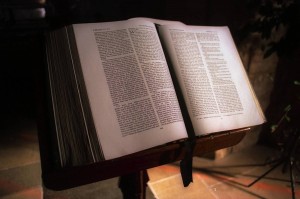
What does the expression “serving two masters†and “being anxious†have in common? They both have the same root problem – being divided within oneself. The root word for “anxiety†literally means “being of two minds.†An anxious person is often “tossed to and fro†and paralyzed by fear, indecision, and insecurity. Fear of some bad outcome cripples those afflicted with anxiety. It’s also the case with someone who wants to live in two opposing kingdoms – God’s kingdom of light, truth, and goodness or Satan’s kingdom of darkness, sin, and deception – following God’s standards and way of happiness or following the world’s standards of success and happiness. Who is the master in charge of your life? Our “master†is whatever governs our thought-life, shapes our ideals, and controls the desires of our heart and the values we choose to live by. We can be ruled by many different things – the love of money and possessions, the power of position and prestige, the glamor of wealth and fame, and the driving force of unruly passions, harmful desires, and addictive cravings. Ultimately the choice of who is our master boils down to two: God or “mammonâ€. What is mammon? “Mammon†stands for “material wealth or possessions†or whatever tends to “control our appetites and desires.â€
 There is one master alone who has the power to set us free from slavery to sin, fear, pride, and greed, and a host of other hurtful desires. That master is the Lord Jesus Christ who alone can save us from all that would keep us bound up in fear and anxiety. Jesus used an illustration from nature – the birds and the flowers – to show how God provides for his creatures in the natural order of his creation. God provides ample food, water, light, and heat to sustain all that lives and breathes. How much more can we, who are created in the very image and likeness of God, expect our heavenly Father and creator to sustain not only our physical bodies, but our mind, heart, and soul as well? God our Father is utterly reliable because it is his nature to love, heal, forgive, and make whole again. Jesus taught his disciples to pray with confidence to their heavenly Father: Give us this day our daily bread. What is bread, but the very staple of life and symbol of all that we need to live and grow. Anxiety is neither helpful nor necessary. It robs us of faith and confidence in God’s help and it saps our energy for doing good. Jesus admonishes his followers to put away anxiety and preoccupation with material things and instead to seek first the things of God – his kingdom and righteousness. Anxiety robs the heart of trust in the mercy and goodness of God and in his loving care for us. God knows our needs even before we ask and he gives generously to those who trust in him. Who is your master – God or mammon?
There is one master alone who has the power to set us free from slavery to sin, fear, pride, and greed, and a host of other hurtful desires. That master is the Lord Jesus Christ who alone can save us from all that would keep us bound up in fear and anxiety. Jesus used an illustration from nature – the birds and the flowers – to show how God provides for his creatures in the natural order of his creation. God provides ample food, water, light, and heat to sustain all that lives and breathes. How much more can we, who are created in the very image and likeness of God, expect our heavenly Father and creator to sustain not only our physical bodies, but our mind, heart, and soul as well? God our Father is utterly reliable because it is his nature to love, heal, forgive, and make whole again. Jesus taught his disciples to pray with confidence to their heavenly Father: Give us this day our daily bread. What is bread, but the very staple of life and symbol of all that we need to live and grow. Anxiety is neither helpful nor necessary. It robs us of faith and confidence in God’s help and it saps our energy for doing good. Jesus admonishes his followers to put away anxiety and preoccupation with material things and instead to seek first the things of God – his kingdom and righteousness. Anxiety robs the heart of trust in the mercy and goodness of God and in his loving care for us. God knows our needs even before we ask and he gives generously to those who trust in him. Who is your master – God or mammon?
“Lord Jesus, free me from needless worries and help me to put my trust in you. May my first and only concern be for your glory and your kingdom of peace and righteousness. Help me to live each day and moment with trust and gratitude for your providential care for me.â€
for the full reflection visit : Daily Reading and Meditation
Tags: catholic, catholic podcast, catholic prayer, cathollc spirituality, don schwager, gospel of matthew
This entry was posted on Sunday, February 27th, 2011 at 2:51 pm
You can follow any responses to this entry through the RSS 2.0 feed.
The Seventh Monday in Ordinary Time – from the Gospel of Matthew the full reading and reflection
“Flesh and blood has not revealed this to you, but my Father who is in heaven”
an excerpt from today’s reflection by Don Schwager: 
At an opportune time Jesus tests his disciples with a crucial question: Who do men say that I am and who do you say that I am? He was widely recognized in Israel as a mighty man of God, even being compared with the greatest of the prophets, John the Baptist, Elijah, and Jeremiah. Peter, always quick to respond, exclaimed that he was the Christ, the Son of the living God. No mortal being could have revealed this to Peter; but only God. Jesus then confers on Peter authority to govern the church that Jesus would build, a church that no powers would overcome. Jesus plays on Peter’s name which is the same word for “rock” in both Aramaic and Greek. To call  someone a “rock” is one of the greatest of compliments. The ancient rabbis had a saying that when God saw Abraham, he exclaimed: “I have discovered a rock to found the world upon”. Through Abraham God established a nation for himself. Through faith Peter grasped who Jesus truly was. He was the first apostle to recognize Jesus as the Anointed One (Messiah and Christ) and the only begotten Son of God. The New Testament describes the church as a spiritual house or temple with each member joined together as living stones (see 1 Peter 2:5). Faith in Jesus Christ makes us into rocks or spiritual stones. The Lord Jesus tests each of us personally with the same question: Who do you say that I am?
someone a “rock” is one of the greatest of compliments. The ancient rabbis had a saying that when God saw Abraham, he exclaimed: “I have discovered a rock to found the world upon”. Through Abraham God established a nation for himself. Through faith Peter grasped who Jesus truly was. He was the first apostle to recognize Jesus as the Anointed One (Messiah and Christ) and the only begotten Son of God. The New Testament describes the church as a spiritual house or temple with each member joined together as living stones (see 1 Peter 2:5). Faith in Jesus Christ makes us into rocks or spiritual stones. The Lord Jesus tests each of us personally with the same question: Who do you say that I am?
“Lord Jesus, I profess and believe that you are the Christ, the Son of the living God. You are my Lord and my Savior. Make my faith strong like Peter’s and give me boldness to speak of you to others that they may come to know you personally as Lord and Savior and grow in the knowledge of your love”.
for the full reflection visit : Daily Reading and Meditation
Tags: catholic, catholic podcast, catholic prayer, cathollc spirituality, don schwager, gospel of matthew
This entry was posted on Tuesday, February 22nd, 2011 at 5:38 am
You can follow any responses to this entry through the RSS 2.0 feed.
The Seventh Sunday in Ordinary Time – from the Gospel of Matthew the full reading and reflection
“Be perfect, as your heavenly Father is perfect”
an excerpt from today’s reflection by Don Schwager: 
Jesus does something quite remarkable and unheard of. He transforms the law of mercy with grace and loving-kindness. Jesus also makes clear that there is no room for retaliation. We must not only avoid returning evil for evil, but we must seek the good of those who wish us ill. Do you accept insults, as Jesus did, with no resentment or malice? When you are compelled by others to do more than you think you deserve, do you insist on your rights, or do you respond with grace and cheerfulness?
What makes Christians different from others and what makes Christianity distinct from any other religion? It is grace – treating others, not as they deserve, but as God wishes them to be treated – with loving-kindness and mercy. God is good to the unjust as well as the just. His love embraces saint and sinner alike. God seeks our highest good and teaches us to seek the greatest good of others, even those who hate and abuse us. Our love for others, even those who are ungrateful and selfish towards us, must be marked by the same kindness and mercy which God has shown to us. It is easier to show kindness and mercy 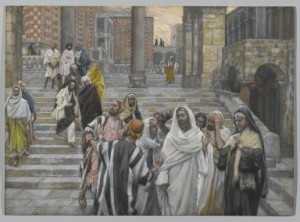 when we can expect to benefit from doing so. How much harder when we can expect nothing in return. Our prayer for those who do us ill both breaks the power of revenge and releases the power of love to do good in the face of evil. How can we possibly love those who cause us harm or ill-will? With God all things are possible. He gives power and grace to those who believe and accept the gift of the Holy Spirit. His love conquers all, even our hurts, fears, prejudices and griefs. Only the cross of Jesus Christ can free us from the tyranny of malice, hatred, revenge, and resentment and gives us the courage to return evil with good. Such love and grace has power to heal and to save from destruction. Do you know the power of Christ’s redeeming love and mercy?
when we can expect to benefit from doing so. How much harder when we can expect nothing in return. Our prayer for those who do us ill both breaks the power of revenge and releases the power of love to do good in the face of evil. How can we possibly love those who cause us harm or ill-will? With God all things are possible. He gives power and grace to those who believe and accept the gift of the Holy Spirit. His love conquers all, even our hurts, fears, prejudices and griefs. Only the cross of Jesus Christ can free us from the tyranny of malice, hatred, revenge, and resentment and gives us the courage to return evil with good. Such love and grace has power to heal and to save from destruction. Do you know the power of Christ’s redeeming love and mercy?
Was Jesus exaggerating when he said we must be perfect as our heavenly Father is perfect? The original meaning of “perfect†in Aramaic is “completeness†or “wholeness – not lacking in what is essential.†God gives us every good gift in Jesus Christ so that we may not lack anything we need to do his will and to live as his sons and daughters (2 Peter 1:3). He knows our weakness and sinfulness better than we do. And he assures us of his love, mercy, and grace to follow in his ways. Do you want to grow in your love for God and for your neighbor? Ask the Holy Spirit to change and transform you in the image of the Father that you may walk in the joy and freedom of the gospel.
“Lord Jesus, your love brings freedom and pardon. Fill me with your Holy Spirit and set my heart ablaze with your love that nothing may make me lose my temper, ruffle my peace, take away my joy, nor make me bitter towards anyone.â€
for the full reflection visit : Daily Reading and Meditation
Tags: catholic, catholic podcast, catholic prayer, cathollc spirituality, don schwager, gospel of matthew, seventh sunday in ordinary time
This entry was posted on Sunday, February 20th, 2011 at 9:21 am
You can follow any responses to this entry through the RSS 2.0 feed.
“Rejoice and be glad, for your reward is great in heaven”
an excerpt from today’s reflection by Don Schwager: 
What is the significance of Jesus’ beatitudes, and why are they so central to his teaching? The beatitudes respond to the natural desire for happiness that God has placed in every heart. They teach us the final end to which God calls us, namely the coming of God’s kingdom (Matthew 4:17), the vision of God (Matthew 5:8; 1 John 2;1), entering into the joy of the Lord (Matthew 25:21-23) and into his rest (Hebrews 4:7-11). Jesus’ beatitudes also confront us with decisive choices concerning the life we pursue here on earth and the use we make of the goods he puts at our disposal. God alone satisfies. Theresa of Avila’s prayer book contained a bookmark which she wrote: “Let nothing disturb you, let nothing frighten you; All things pass: God never changes. Patience achieves all it strives for. Whoever has God lacks nothing, God alone suffices.” Is God enough for you? God offers us the greatest good possible – abundant life in Jesus Christ (John 10:10) and the promise of unending joy and happiness with God. Do you seek the highest good, the total good, which is above all else?
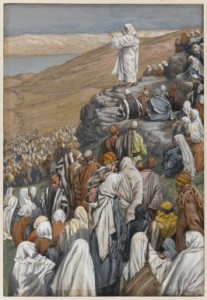 The beatitudes which Jesus offers us are a sign of contradiction to the world’s understanding of happiness and joy. How can one possibly find happiness in poverty, hunger, mourning, and persecution? Poverty of spirit finds ample room and joy in possessing God as the greatest treasure possible. Hunger of the spirit seeks nourishment and strength in God’s word and Spirit. Sorrow and mourning over wasted life and sin leads to joyful freedom from the burden of guilt and spiritual oppression. God reveals to the humble of heart the true source of abundant life and happiness. Jesus promises his disciples that the joys of heaven will more than compensate for the troubles and hardships they can expect in this world. Thomas Aquinas said: “No one can live without joy. That is why a person deprived of spiritual joy goes after carnal pleasures.” Do you know the happiness of hungering and thirsting for God alone?
The beatitudes which Jesus offers us are a sign of contradiction to the world’s understanding of happiness and joy. How can one possibly find happiness in poverty, hunger, mourning, and persecution? Poverty of spirit finds ample room and joy in possessing God as the greatest treasure possible. Hunger of the spirit seeks nourishment and strength in God’s word and Spirit. Sorrow and mourning over wasted life and sin leads to joyful freedom from the burden of guilt and spiritual oppression. God reveals to the humble of heart the true source of abundant life and happiness. Jesus promises his disciples that the joys of heaven will more than compensate for the troubles and hardships they can expect in this world. Thomas Aquinas said: “No one can live without joy. That is why a person deprived of spiritual joy goes after carnal pleasures.” Do you know the happiness of hungering and thirsting for God alone?
“Lord Jesus, increase my hunger for you and show me the way that leads to everlasting peace and happiness. May I desire you above all else and find perfect joy in doing your will.”
for the full reflection visit : Daily Reading and Meditation
Tags: catholic, catholic podcast, catholic prayer, cathollc spirituality, don schwager, gospel of matthew, teaching the beatitudes, theresa of avila
This entry was posted on Sunday, January 30th, 2011 at 11:11 am
You can follow any responses to this entry through the RSS 2.0 feed.
The Baptism of the Lord – from the Gospel of Matthew the full reading and reflection
This is my beloved Son, with whom I am well pleased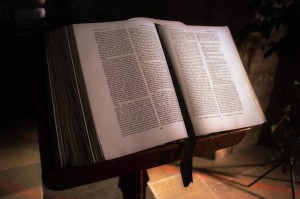
an excerpt from today’s reflection by Don Schwager:
John preached a baptism of repentance for the forgiveness of sins (Luke 3:3). Why did Jesus, the Sinless One, submit himself to John’s baptism? In this humble submission we see a foreshadowing of the “baptism†of his bloody death upon the cross. Jesus’ baptism is the acceptance and the beginning of his mission as God’s suffering Servant. He allowed himself to be numbered among sinners. Jesus submitted himself entirely to his Father’s will. Out of love he consented to this baptism of death for the remission of our sins. Do you know the joy of trust and submission to God?
 The Father proclaimed his entire delight in his Son and spoke audibly for all to hear. The Holy Spirit, too, was present as he anointed Jesus for his ministry which began that day as he rose from the waters of the Jordan river. Jesus will be the source of the Spirit for all who come to believe in him. At his baptism the heavens were opened and the waters were sanctified by the descent of Jesus and the Holy Spirit, signifying the beginning of a new creation.
The Father proclaimed his entire delight in his Son and spoke audibly for all to hear. The Holy Spirit, too, was present as he anointed Jesus for his ministry which began that day as he rose from the waters of the Jordan river. Jesus will be the source of the Spirit for all who come to believe in him. At his baptism the heavens were opened and the waters were sanctified by the descent of Jesus and the Holy Spirit, signifying the beginning of a new creation.
“Lord Jesus, fill me with your Holy Spirit and inflame my heart with the joy of the gospel. May I find joy in seeking to please you just as you found joy in seeking to please your Father”.
for the full reflection visit : Daily Reading and Meditation
Tags: baptism of the lord, catholic, catholic podcast, catholic prayer, cathollc spirituality, don schwager, gospel of matthew
This entry was posted on Sunday, January 9th, 2011 at 12:03 am
You can follow any responses to this entry through the RSS 2.0 feed.
The Monday After Ephiphany – from the Gospel of Matthew the full reading and reflection
“The people who sat in darkness have seen a great lightâ€
an excerpt from today’s reflection by Don Schwager:
In announcing the good news, Jesus made two demands: repent and believe! Repentance requires a life-change and a transformation of heart and mind. The Holy Spirit gives us a repentant heart, a true sorrow and hatred for sin and its consequences, and a firm resolution to avoid it in the future. The Holy Spirit gives us grace to see our sin for what it is – rebellion and a rejection of the love of God. God’s grace helps us to turn away from all that would keep us from his love. Faith or belief is an entirely free gift which God makes to us. Believing is only possible by grace and the help of the Holy Spirit who moves the heart and converts it to God. The Holy Spirit opens the eyes of the mind and makes it easy for us to accept and believe the truth. To believe is to take Jesus at his word, to believe that God loved us so much that he sent his only begotten Son to redeem us from the slavery of sin and death. God made the supreme sacrifice of his Son on the cross to bring us back to himself. Do you know the love of God that surpasses all else and that impels us to give him our all? God wants to change our way of thinking and transform our lives by the power of his word.
“Lord Jesus, your ways are life and light! Let your word penetrate my heart and transform my mind that I may see your power and glory. Help me to choose your ways and to do what is pleasing to you”.
for the full reflection visit : Daily Reading and Meditation
Tags: catholic, catholic podcast, catholic prayer, cathollc spirituality, don schwager, gospel of matthew, repentance
This entry was posted on Monday, January 3rd, 2011 at 5:18 am
You can follow any responses to this entry through the RSS 2.0 feed.
 The Solemnity of the Epiphany – from the Gospel of Matthew the full reading and reflection
“They fell down and worshiped Jesus”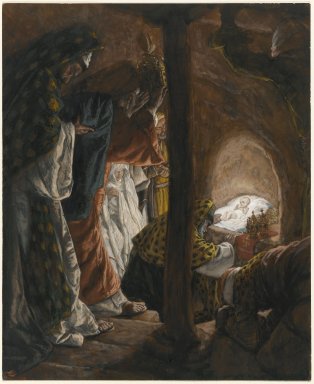
an excerpt from today’s reflection by Don Schwager:
The Lord of the universe who revealed the star of Bethlehem to the Gentiles of the East so they could come and worship Jesus, the Prince of Peace (Isaiah 9:6) and King of Kings (Revelations 19:16), gives each one of us the same light of revelation to recognize and accept Jesus as our Lord and Savior. Faith is an entirely free gift that God makes to us. It is through the help of the Holy Spirit, who moves the heart and opens the eyes of the mind, that we are able to understand, accept, and believe the truth which God has revealed to us through his Son, Jesus Christ. In faith, the human will and intellect cooperate with grace. “Believing is an act of the intellect assenting to the divine truth by command of the will moved by God through grace” (Thomas Aquinas).
To know and to encounter Jesus Christ is to know God personally. In the encounter of the wise men with Jesus we see the plan of God to give his only Son as King and Savior, not just for the Jewish people but for all the nations as well. The Lord Jesus came that both Jew and Gentile might find true and lasting peace with God. Let us pray today that Jew and Gentile alike will find the Lord and Savior on their journey of life. Do you bring the light of Jesus Christ to those you meet through the witness of your life and testimony?
“Lord Jesus Christ, we thank you for bringing salvation to all the nations. May the gospel of salvation be proclaimed to every nation today and to every person on the face of the earth. Help me to be a good witness of the joy of the gospel to all I meet.”
for the full reflection visit : Daily Reading and Meditation
Tags: catholic, catholic podcast, catholic prayer, cathollc spirituality, don schwager, gospel of matthew, magi, solemnity of the epiphany, star of bethlehem
This entry was posted on Sunday, January 2nd, 2011 at 12:05 am
You can follow any responses to this entry through the RSS 2.0 feed.

